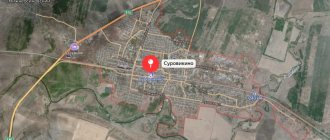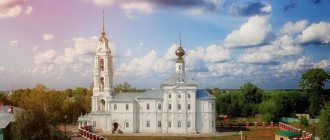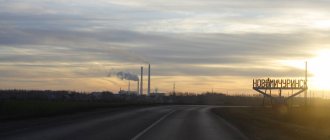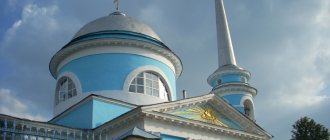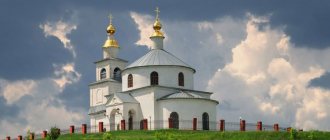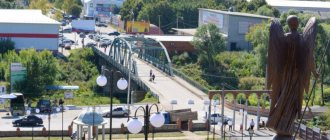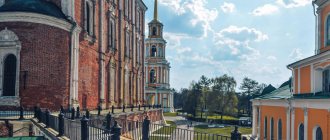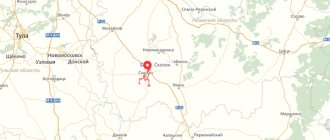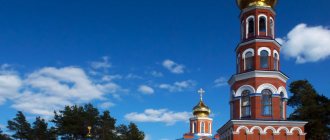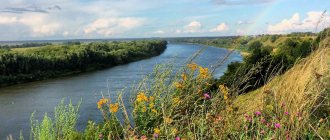History and sights of the regional center of Shilovo, Ryazan region
One of the large regional centers of the Ryazan region is the urban-type settlement of Shilovo. This region is considered the birthplace of the Russian heroes Evpatiy Kolovrat and Dobrynya Nikitich, as well as the poet Nikolai Gumilyov and academician philologist I.I. Sreznevsky. We have vacationed in this area more than once in the summer with friends. In good weather, you can spend whole days on the Oka River, enjoying beach holidays and fishing. And even residents of Ryazan, which is located a hundred kilometers from Shilovo, come to pick mushrooms in the surrounding forests. But even in autumn there is something to see in the Shilovsky district: these are ancient villages and estates associated with such big names as the Olsufievs, Lunins and Golitsyns. In addition, a huge number of ancient pre-Christian settlements have been found in the region, which are annually visited by archeology lovers from all over the country. Today my story is dedicated to advanced travelers who want to visit an interesting, but not well-known area of the Ryazan region.
Shilovo
For people traveling from Moscow to Kasimov and wanting to see such amazing estates of Baron von Derviz as Kiritsy and Starozhilovo, Shilovo is an excellent place for rest and overnight, as there are three small hotels and several cafes in the village.
Stories about Kasimov
Estate in Kiritsy
Excursion groups regularly come from Ryazan to Shilovo to visit the local history museum, one of the largest in the region, and the ethnocultural museum. In addition, in the summer, the village hosts the willow weaving festival “Iva-Ivushka” and “Neptune’s Day” with mass celebrations on the banks of the Oka. We often visit the Ryazan region, we love this region, and finally we managed to get to Shilovo.
Shilovo
Numerous excavations constantly carried out on the Shilovsky land prove the existence of settlements of ancient people here several thousand years before our era. Later, Finno-Ugric tribes began to inhabit the surrounding lands. Around the 10th-11th centuries, the Slavs came here, and the city of Nersk appeared on the right bank of the Oka, or it is also called Nerskoye. In the 14th century, the Ryazan princes transferred Nersk to the Shilovsky brothers, who came from Lithuania, and after that the city began to be called Shilov. In the 16th century, when the Ryazan principality was annexed to the Moscow principality, fortifications began to be erected in the vicinity of Shilovo to protect the borders of the state from the raid of the Tatars, because the Nogai Highway passed very close.
Shilovo
Until the 17th century, Shilovo was considered an important grain pier: ships paid a duty for transporting goods, which was collected only at three piers in this direction. And quite a few ships sailed here at that time: about 600 ships a year. Gradually, the borders of the state moved away, and Shilovo lost its border position, turning into a small village. At the end of the 19th century, the Kazan Railway was built through Shilovo. With the advent of Soviet power, the village began to gradually grow, turning into a regional center.
Legends of Shilovo, Ryazan region
In addition to the official versions of the origin of the name “Shilovo” and the founding of the village, there are also legends. The first suggests that there used to be impassable swamps here. One day a merchant who sold awl was driving past. He had goods for several convoys. One cart overturned, awls scattered on the ground, and the place began to be called Shilovo.
The second legend tells how three Russian hunters wandered into dense forests in the vicinity of the village of Borok. They wandered for a long time and finally came to the local Mordovian settlement. They were received kindly and the brothers were allowed to rest. One of the hunters fell in love with the daughter of a local prince and asked for her hand in marriage. The father flatly refused to consent to such a marriage. Then the brothers kidnapped the girl and fled. The Mordovian prince overtook them in the area of Shilovskaya Ryazanskaya Street and cut them into pieces. The girl, unable to bear the death of her beloved, rushed into the river as she left the village. Since the name of the daughter of the Mordovian prince was Parava, the river was named Para in her honor. At the same time, one of the hunter brothers still survived, although he was severely wounded. He began to pray for salvation and saw a falcon. He crawled after the bird and ended up on the banks of the Oka, where underground springs flow and medicinal herbs grow. The falcon brought food to the young man and gradually the hunter recovered. One day he saw something glowing floating along the river. He came closer and saw the icon of the Dormition of the Blessed Virgin Mary. The hunter then built a small church on the shore and began to live there. Gradually other houses began to appear around the temple, and that’s how Shilovo appeared.
And what to see in Shilovo?
Now it is a fairly large village, where there are three schools, a hospital, a sports complex with a swimming pool, a small hotel and a cultural center. In Soviet times, there was even a cinema “Cosmos”, which, unfortunately, ceased to exist. The ancient settlement was located in the area of the Assumption Church, originally built in the 14th century.
Shilovo
The modern stone building of the temple was erected in the middle of the 19th century at the expense of parishioners and the local landowner A. Kolemin according to the design of the Ryazan architect Voronikhin. Next to the Assumption Church there is a local history museum, which contains numerous archaeological finds from the excavation sites of ancient settlements, as well as various household items that tell about the life of people in Shilovo in different eras.
We move further towards the hospital, in the park of which there is a monument to the hero of the civil war, submariner, and later an active fighter against banditry in the Shilovsky district, Vasily Yakovlevich Isaev.
Shilovo
In May 1919, the submarine Lamprey fought with British intervention ships in the Caspian Sea and was seriously damaged, requiring it to be towed to a safe place. But, unfortunately, it turned out that the boat's propellers became entangled in the steel cables. Vasily Isaev volunteered to free the ship. To do this, he spent several hours in cold water without special diving equipment and completed the task, for which he was awarded the order. After demobilization, Isaev returned to his native village and joined the ranks of the police, and during his long service he neutralized more than one gangster group. Vasily Yakovlevich was a kind of Sharapov of the Shilov land.
Further on, on Sovetskaya Street, near the bank, a monument to the collective image of a local worker was erected on the trunk of an old linden tree.
Shilovo
But the most interesting monuments in Shilovo are the monuments to two Russian heroes. One rises on Sovetskaya Square in front of the Palace of Culture - this is the first Russian partisan Evpatiy Kolovrat.
Shilovo
Its homeland is the village of Frolovo, Shilovsky district. This Ryazan governor was away when the Tatar army attacked Ryazan in 1237 and destroyed the city. Returning home and seeing what a disaster had happened in his native land, Evpatiy with a small army rushed in pursuit, and having overtaken the Tatars, he began to beat them mercilessly. Despite the fact that the numerical superiority was on the side of Batu’s army, Kolovrat managed to destroy many of his soldiers. They say that Batu even sent messengers to ask what the hero needed. In response, Evpatiy Kolovrat replied: “Only die!” As a result, the Russian hero was nevertheless killed by the Tatars, but as a sign of respect for his bravery and courage, Batu handed over Kolovrat’s body to the surviving Russian soldiers and allowed him to be buried in his native land. The second famous character of Russian epics, one of the three heroes Dobrynya Nikitich, is also immortalized near Shilovo, on the road to the village of Pribrezhny. It’s worth driving just a few kilometers, and we see on a hill a shield and a sword, framed by the figure of a warrior.
Shilovo
This is the Dobrynin Kurgan, which appeared here quite recently. Several settlements of the Ryazan region are arguing for the right to be called the birthplace of the hero. However, they say that in pre-war times, a mound was discovered in the forest near the village of Pribrezhny, in which the remains of a warrior with a sword and a belt decorated with gold links were excavated. These finds fell into private hands and were never seen again. And people began to believe that they had found the body of the hero Dobrynya, who died in the battle.
Interesting sights in the vicinity of Shilovo
In addition, near Shilovo there are villages with an interesting history. For example, the village of Zheludevo is interesting, which is the paternal homeland of the famous poet Nikolai Gumilyov.
Village Zheludevo
Since 1676, there has been a wooden Church of the Nativity in the village. Later, in 1811, at the expense of the landowner Pyotr Mikhailovich Lunin, Mikhail Sergeevich’s uncle, who lived in the Lunino estate, they began to build a stone temple, which has survived to this day.
Ryazan Oblast
Pyotr Mikhailovich Lunin was famous for his extravagant behavior and was known as a great gourmet. They say that he came to a dinner party in Warsaw with his French cook. And when in 1812, Moscow residents hurriedly left their homes, and Napoleon’s army was approaching the capital, Pyotr Mikhailovich gave orders for dinner preparations in his house on Nikitsky Boulevard. Only after urgent persuasion from his relatives did Lunin become one of the last to leave the capital. Ironically, his house was one of the few that survived the fire.
The daughter of Pyotr Mikhailovich was the famous singer Ekaterina Petrovna Lunina-Ricci, who conquered both Europe and Russian high society with her singing. After the death of her father, she and her mother sold numerous estates in the Ryazan region, including the estate complex in the village of Zheludevo, and the village of Zadubrovye, in which at the moment only the Church of St. Nicholas the Wonderworker has survived.
Ryazan Oblast
By the way, Pyotr Mikhailovich Lunin was buried right in Zheludevo, and his funeral service was performed by priest Fyodor Gumilev, whose sister the grandfather of the famous poet Nikolai Gumilev, Yakov Panov, was married to. When he decided to marry the daughter of priest Grigory Gumilyov, a prerequisite for such a marriage was that the groom, who was the clerk of the local Nativity Church, would take his wife’s surname after the wedding. Their youngest son Stepan, the poet's father, graduated from the Ryazan theological educational institution, where medicine was taught as an additional subject. This is what Stepan Yakovlevich Gumilyov decided to devote his life to. Later, he graduated from Moscow University with a degree in medicine and began working as a doctor in Kronstadt. The poet’s mother was Anna Ivanovna Lvova, a representative of an old noble family. It is known that the poet and his family often spent the summer months on the Ryazan estate Berezki and visited his grandfather in Zheludevo. Quite a few old pre-revolutionary brick houses have still been preserved in this village. Near the Church of the Nativity you can see the remains of a manor house and an old cemetery. In addition, there is a club in the village, near which there is a very picturesque pond.
Ryazan Oblast
Village Inyakino
Another interesting settlement in the Shilovsky district is the village of Inyakino, where the remains of an ancient settlement have been preserved. The modern village was founded by the hero of the war of 1812, General Z.D. Olsufiev, who received it for services to the fatherland. With his funds, in the first half of the 19th century, the Assumption Church was built, which can be seen here and now. Even in our time, the size of the church, which was created by the labor of thousands of serfs, is amazing.
Ryazan Oblast
The architectural monuments of the Shilovsky district certainly deserve attention, but the main advantage of this region is its amazing nature: the high banks of the Oka, water meadows and dense forests rich in mushrooms and berries.
Ryazan Oblast
Ryazan Oblast
Ryazan Oblast
Holidays in such picturesque places allow you to escape from the bustle of the city and enjoy the quiet joys of the countryside.
Status
Municipal entity - Shilovsky municipal district is an independent municipal entity within the Ryazan region.
The Shilovsky district in its current form was formed in 1965 by the Decree of the Presidium of the Supreme Soviet of the RSFSR dated January 12, 1965.
The charter of the municipal formation - Shilovsky municipal district was adopted by decision of the Council of Deputies on January 24, 1997 No. 6.
The current version of the Charter was adopted by a decision of the Council of Deputies dated December 20, 2010. No. 16/162) (Registered in the department of the Main Directorate of the Ministry of Justice of the Russian Federation for the Central Federal District in the Ryazan region on January 13, 2011).
Communications, media
The installed capacity of municipal telephone networks is:
city telephone network (GTS) – 4128 numbers;
rural telephone network (RTS) – 1894 numbers.
102 universal payphones were installed, incl. city telephone network (GTS) – 3; rural telephone network (STS) – 99.
In the municipality - Shilovsky municipal district, there is a network of radio points. On the territory of the municipality there are branches of the Ryazan branch of MTS and Beeline. Megafon and TELE 2. Municipal entity - Shilovsky municipal district has its own cable television studio in the village. Lesnoy (MP "Astra"). The cable television network provides residents of the village. Lesnoy 20 TV channels.
The municipality publishes the newspaper “Shilovsky Vestnik”.
Population
3.0% of the population of the Ryazan region lives on the territory of the municipal formation - Shilovsky municipal district. The share of the rural population is 42.2%.
There are 108 settlements located on the territory of the municipality. The largest of them:
R. Shilovo village - 15,461 thousand people;
With. Inyakino - 1.081 thousand people;
R. Lesnoy village - 7.658 thousand people;
With. Mosolovo - 1.385 thousand people;
With. Erakhtur - 1.008 thousand people;
With. Sasykino - 1.171 thousand people.
The demographic situation is characterized by negative natural growth.
Administrative division
The municipality includes 2 urban settlements :
— Shilovskoye (Shilovo settlement) – 4 settlements: Shilovo village, village. Borok, Krivtsovo village, New Life village.
— Lesnovskoye (Lesnoy settlement) – 11 settlements: Lesnoy village, village. Alehovo, Krasny Luch village, Munyakovskie Vyselki village, Novaya Derevnya village, village. Novaya Pustyn, Novoershovo village, Yamskoy village, Zeleny Bor village, Malinovka village, Novomosolovsky village.
and 15 rural settlements :
— Adelinskoye (village Adelino) – 11 settlements: village. Adelino, Krasny Khutor village, Krylovka village, Nekrasovka village, Orekhovka village, Sverdlovka village, Sergievka village 1, Sergievka village 2, Smirnovka village, village. Nasledniche, village Narezka.
— Borkovskoe (village Borki) – 5 settlements: village. Borki, Kopanovo village, Polevoy village, Svinchus, Simakino village.
— Borovskoye (Borovoe village) – 6 settlements: village. Borovoe, Aleksandrovka village, Vanchur village, Elizavetinka village, Konstantinovka village, Usha village.
— Erakhturskoe (village Erakhtur) – 7 settlements: village. Erakhtur, s. Kuzemkino, Ladyshkino village, Maksheevo village, Mordasovo village, village. Rubetskoye, s. Narmushad,
— Zheludevskoye (village Zheludevo) - 3 settlements: village. Zheludevo, village Avdotinka, village. Sanovka.
— Zanino-Pochinkovskoye (village Zanino-Pochinki) – 14 settlements: village. Zanino-Pochinki, Belorechensky village, village. Ilebniki, s. Lubonos, village Munor, village Salaur, village Pavlovka, village Pogari, village. Bolshie Peksely, village of Malye Peksely, village. Muscle, p. Vyaz, Shemyakino village, Proletarsky village.
— Zadubrovskoe (village Zadubrovye) – 8 settlements: village. Zadubrovye, village Krutitsy, Myshkar village, s. Pustopolye, Bortnikovo village, village. Konstantinovo, s. Lunino, s. Sreznevo.
— Ibredskoye (Molodezhny settlement) – 2 settlements: Ibred village, Sasykino village.
— Inyakinskoye (village Inyakino) – 3 settlements: village. Inyakino, Poltavka village, Seltso-Sergievka village.
— Krasnokholmskoye (village Krasny Kholm) – 4 settlements: village. Krasny Kholm, Krasnokholmskie Vyselki village, Neplozha village, Chembar village.
— Mosolovskoye (Mosolovo village) – 15 settlements: village. Mosolovo, Voruzhka village, Zapolye village, Ivanovka village, Krasnogvardeisky village, Maryiny Khutora village, Nikolaevka village, Frolovo village, Shelukhovo village, Muratovo, Debra village, village. Cassocks, Sloboda village, Yasakovsky village, Taidakovo village.
— Sanskoye (Sanskoye village) – 3 settlements: village. Sanskoye, Fedoseevo-Pustyn village, Yushta.
— Tyrnovskoye (Tyrnovo village) – 3 settlements: village. Tyrnovo, village Akulovo, village. Dubrovka.
— Timoshkinskoye (Timoshkino village) – 6 settlements: village. Timoshkino, Kharinsky village, Rucheek, village. Berezovo, Krasny village, Pervomaisky village, Krasnaya Olkhovka village.
— Terekhovskoe (Terekhovo village) – 3 settlements: village. Terekhovo, s. Iritsy, s. Nadeino.
Climate, minerals, water resources, soils, forests
The climate of the area is temperate continental, with warm summers and moderately cold winters. Precipitation is distributed unevenly throughout the year.
Mineral resources – peat, building stones, clays, sand for road construction, phosphates.
Water resources are determined by the rivers Oka, Para, Tyrnitsa, Vechug, Srednik and others. Of the lakes, the largest are lakes San, Chudino, Tish, Glubokoe.
Soils. The main part of the territory of the municipal formation is occupied by soddy-podzolic (53.2%) and gray forest soils (43.6%). They have a predominantly light mechanical composition and require organic and mineral fertilizers.
Forests occupy about 27.5% of the district's territory. In the northeastern and eastern parts there is the Erakhturskoye forestry, in the central - the Pervomaiskoye forestry, in the southern - the Shelukhovskoye forestry.
